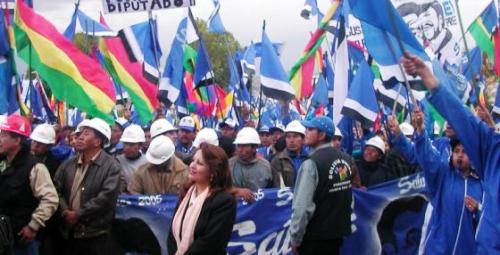|
Bolivia Facts: Bolivian Politics In
Bolivia
politics are very, very complicated. There are more than 20 active parties at any given time, many of which are militant, others which are severely idealist, representing a great variety of ideologies including different definitions of democracy, communism, capitalism, fascism, and others in between.
The military has been very involved in Bolivia throughout its entire history, having been used by various parties to stage coups, keep public order, and squelch members of the opposition. With the existence of so many different parties of varying ideologies, a single party rarely holds a majority position in the public eye, or during elections.
The Bolivian Constitution calls for a clear majority vote for members of any one party to be elected to the positions of president and vice-president. However, if no party obtains a clear majority vote, Congress is to select and appoint a president from amongst the highest-ranking candidates. Because of this, many parties form “coalitions”. And since members of Congress are also representatives of specific parties, they typically select as president the candidate who heads the coalition in which their party is involved. Thus, although public elections are held, some presidents in Bolivia are ultimately elected by Congress. Traditionally Bolivia’s minority elite class has dominated politics (and the economy in Bolivia) which has resulted in a deep feeling of injustice by the country’s native and indigenous people, most of whom live in poverty, have little access to education and healthcare, and often don't benefit from any revenues the economy provides - although they comprise over one third of the population. The government has also been rife with corruption because the country’s economy has depended so highly upon relationships and players, most of whom also own the majority of the country’s major businesses and industry. Although constitutionally all parties must be granted access to an equal amount of government funds for campaign publicity and candidatures during election periods, candidates may also use donated funds, party-raised funds and their own funds. Click here for more information on how Bolivian politics have shaped the history of Bolivia and economy. Find out what it's really like to live in Bolivia during a campaign season! Click here for some interesting Bolivian political facts and trivia. Visit this section on voting in Bolivia, voting rights and obligations, and the role of the electoral courts, judges, notaries, and juries. The Town Hall Meeting of One MillionBolivians, especially young people are very politically involved. People are active in voicing their needs and views and frequently the turn-out at political rallies and other events numbers in the hundreds and even thousands. Slogans and music abound. In December 2006, a town meeting called a "cabildo" in Santa Cruz (city of 1.5 million inhabitants) made international headlines when over one MILLION people attended to voice their desire for autonomy from the central government*. It came to be known as "El Cabildo del Millón". Notice the complete silence and concentration while Santa Cruz' governor asks the referendum questions. Did you ever see a million people so silent? By the way, this was historic as 2/3 of the cities population flooded the streets. *Basically, the idea behind autonomy is to have a government system similar to the United States in which there is a federal government and federal laws and taxes, but each individual state also has a state government with state laws and state taxes. https://youtu.be/mvoo8oMMHUQ A New Constitution for Bolivia2008 was a turbulent year in Bolivia. Tens of thousands of supporters of President Evo Morales marched several times throughout different parts of the country to force Congress to pass a law that would allow the president to call a national referendum so the country's entire population can vote on his proposed text for a new constitution. August - October were especially violent months during which time Morales' supporters and members of opposition parties clashed on various occasions. On October 21st, with nearly 20,000 people surrounding the congress building in La Paz, Congress members passed this law under pressure. The referendum took place on January 25, 2009. Even though agreements were reached on modifications to 120 articles in Morales' proposed text, which contains 411 articles, five of Bolivia's nine states oppose it because the dialogue on modifications was never completed in Congress. Vice President García Linera unexpectedly called for a congressional vote to appease the thousands of protesters surrounding the Congress building in La Paz, even though negotiations were ongoing in another room. Approximately 54% of Bolivia's population voted to approve the new constitution on January 25th 2009. It is interesting, however to note that in four of the nine states it did not pass, and in one (Pando) it passed with a 51% margin. The distribution of the population of Bolivia was deciding factor. It will be very interesting to follow politics in Bolivia. President Evo Morales called for national elections in December 2009, cutting his mandate off early (he had been slated to be president through 2011) and was re-elected for another 5-year term. He attempted to get a law passed that would allow him to run for president perpetually with no term limits but this was not passed. Since his re-election, the President's MAS party has been plagued by allegations of corruption (although this has been common among all parties in power) and this has caused the government many problems and a great loss of confidence among voters and internationally. In addition, the executive branch of the government has either limited or overtaken the powers of the judicial and legislative branches, casting further doubt on the future of democracy in Bolivia.     |
